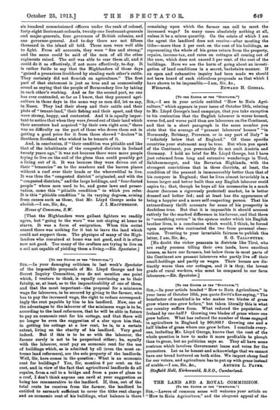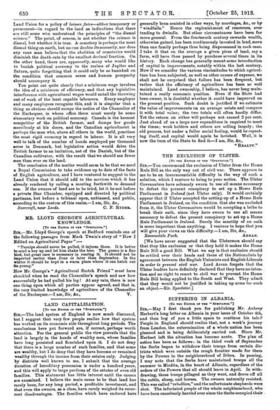THE LAND AND A ROYAL COMMISSION.
ITO TEE EDITOR OP THE "SPECTATOR."]
Sra,—Lovers of common sense will welcome your article on "How to Ruin Agriculture," and the eloquent appeal of the Land Union for a policy of laissez faire—either temporary or permanent—in regard to the land as indications that there are still some who understand the principles of "the dismal science." The point, of course, is not whether the science is dismal, but whether it is true. A cemetery is perhaps the most dismal thing on earth, but no cne doubts its necessity, nor does any sane man believe that the abolition of cemeteries would diminish the death-rate by the smallest decimal fraction. On the other hand, there are, apparently, many who would like to banish political economy to the realms of Jupiter and Saturn, quite forgetting that it could only be so banished on the condition that common sense and human prosperity should accompany it.
You point out quite clearly that a minimum wage involves the idea of a minimum of efficiency, and that any legislative interference with agricultural wages would entail the throwing out of work of the least capable labourers. Every employer and many employees recognize this, and it is singular that a thing so obvious should escape the notice of the Chancellor of the Exchequer, in whose office there must surely be some elementary work on political economy. Canada is the keenest competitor of the British farmer, and dumps her goods mercilessly at his doors, and the Canadian agriculturist is perhaps the man who, above all others in the world, practises the most rigid economy in regard to labour. It is all very well to talk of the number of hands employed per thousand acres in Denmark, but legislative action would drive the British farmer to an imitation, not of the Danish, but of the Canadian cultivator, with the result that we should see fewer men than ever on the land.
The conclusion of the matter would seem to be that we need a Royal Commission to take evidence up to date of the facts of English agriculture, and I have ventured to suggest to the Land Union that it should add to the services which it has already rendered by calling a meeting forthwith to demand
one. If the owners of land are to be tried, let it be not before a private Star Chamber, equipped and directed by political partisans, but before a tribunal open, unbiassed, and public, according to the custom of this realm.—I am, Sir, &c.,















































 Previous page
Previous page